医疗问题高考模拟英语作文
医疗话题英语作文模版
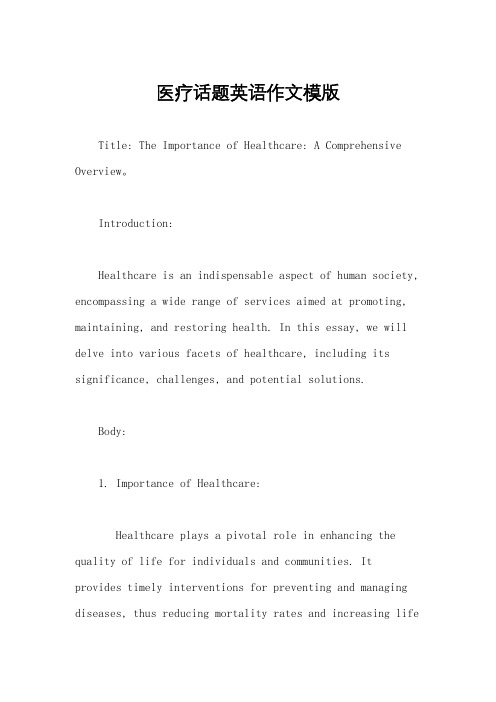
医疗话题英语作文模版Title: The Importance of Healthcare: A Comprehensive Overview。
Introduction:Healthcare is an indispensable aspect of human society, encompassing a wide range of services aimed at promoting, maintaining, and restoring health. In this essay, we will delve into various facets of healthcare, including its significance, challenges, and potential solutions.Body:1. Importance of Healthcare:Healthcare plays a pivotal role in enhancing the quality of life for individuals and communities. It provides timely interventions for preventing and managing diseases, thus reducing mortality rates and increasing lifeexpectancy. Moreover, access to healthcare services ensures that individuals can lead productive lives, contributing to economic development.2. Healthcare Systems Worldwide:Healthcare systems vary across countries, ranging from publicly funded systems to private insurance-based models. Each system has its strengths and weaknesses, influencing factors such as accessibility, affordability, and quality of care. For instance, countries with universal healthcare coverage often demonstrate better health outcomes and lower healthcare disparities.3. Challenges in Healthcare:Despite significant advancements, healthcare systems face numerous challenges. These include rising healthcare costs, unequal access to care, shortage of healthcare professionals, and the burden of chronic diseases. Additionally, emerging infectious diseases and global health crises, such as the COVID-19 pandemic, underscorethe need for robust healthcare infrastructures and preparedness.4. Technological Innovations in Healthcare:Technological innovations have revolutionized healthcare delivery, offering new solutions for diagnosis, treatment, and patient care. Examples include telemedicine, electronic health records, wearable devices, and precision medicine. These innovations improve efficiency, accuracy, and patient outcomes while enhancing accessibility to healthcare services, particularly in remote or underserved areas.5. Addressing Healthcare Disparities:Addressing healthcare disparities is essential for achieving equitable health outcomes. Strategies may include expanding access to healthcare services through community clinics, implementing preventive health programs, increasing cultural competency among healthcare providers, and advocating for policies that promote health equity.Furthermore, fostering collaboration between public health agencies, healthcare institutions, and community organizations can facilitate comprehensive approaches to addressing disparities.6. Future Directions in Healthcare:Looking ahead, healthcare systems must adapt to evolving demographic, epidemiological, and technological trends. This entails investing in preventive care, promoting population health initiatives, embracing digital health technologies, and strengthening healthcare infrastructure resilience. Additionally, fostering interdisciplinary collaboration and innovation will be crucial for addressing complex health challenges and improving healthcare delivery.Conclusion:In conclusion, healthcare is fundamental to human well-being and societal progress. By addressing challenges, embracing innovations, and promoting equity, we can buildstronger healthcare systems that benefit individuals and communities worldwide. Through concerted efforts and collaboration, we can strive towards a future where healthcare is accessible, affordable, and effective for all.[Word Count: XXX](Note: Please replace "XXX" with the actual word countof your essay.)。
医学矛盾英文作文

医学矛盾英文作文1. Medicine is a field full of contradictions. On one hand, we have the incredible advancements in technology and treatment options that have greatly improved patient outcomes. On the other hand, we still struggle with the basic issue of access to healthcare for all individuals.2. The concept of evidence-based medicine is widely accepted and promoted in the medical community. However, there are still many instances where medical decisions are made based on clinical experience and intuition rather than solely relying on scientific evidence.3. The healthcare system is often praised for itsability to save lives and provide necessary care. But at the same time, it is criticized for being impersonal and lacking the human touch. Patients often feel like just another number in a system that prioritizes efficiency over empathy.4. Medical professionals are highly respected and admired for their knowledge and expertise. Yet, they are also seen as unapproachable and intimidating, making it difficult for patients to ask questions or fully understand their own health conditions.5. In recent years, there has been a growing emphasis on preventive medicine and promoting a healthy lifestyle. However, the healthcare system still heavily relies on treating illnesses and diseases rather than focusing on prevention.6. The cost of healthcare is a major concern for many individuals and families. While medical advancements have undoubtedly improved outcomes, they have also contributed to skyrocketing healthcare costs, making it unaffordablefor many.7. Medicine is constantly evolving, with new research and discoveries being made every day. However, this also means that medical knowledge becomes outdated quickly, leading to conflicting opinions and recommendations fromdifferent healthcare professionals.8. The field of medicine is often associated with saving lives and providing hope. But it also involves making difficult decisions, such as end-of-life care and determining when to stop treatment, which can be emotionally challenging for both patients and healthcare providers.9. The medical field is highly regulated and standardized to ensure patient safety. However, this can sometimes lead to a lack of flexibility and individualized care, as healthcare providers are bound by strict protocols and guidelines.10. Medicine is a field that requires constant learning and adaptation. Healthcare professionals must stay up to date with the latest research and advancements, but they also need to balance this with the practical realities of patient care and limited resources.In conclusion, the field of medicine is a complex andcontradictory one. It is both awe-inspiring and flawed, with advancements and challenges existing side by side. As we continue to navigate these contradictions, it is important to strive for a healthcare system that is accessible, compassionate, and evidence-based.。
医学英文作文模板
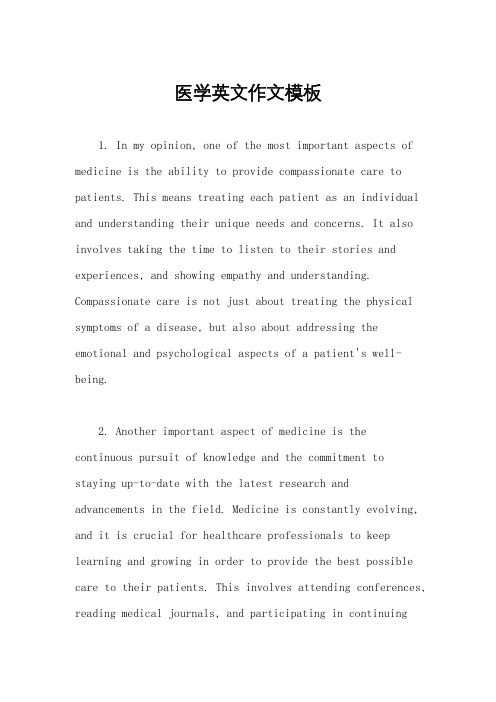
医学英文作文模板1. In my opinion, one of the most important aspects of medicine is the ability to provide compassionate care to patients. This means treating each patient as an individual and understanding their unique needs and concerns. It also involves taking the time to listen to their stories and experiences, and showing empathy and understanding. Compassionate care is not just about treating the physical symptoms of a disease, but also about addressing the emotional and psychological aspects of a patient's well-being.2. Another important aspect of medicine is the continuous pursuit of knowledge and the commitment tostaying up-to-date with the latest research and advancements in the field. Medicine is constantly evolving, and it is crucial for healthcare professionals to keep learning and growing in order to provide the best possible care to their patients. This involves attending conferences, reading medical journals, and participating in continuingeducation programs. By staying informed and knowledgeable, healthcare professionals can make informed decisions and provide evidence-based care.3. Effective communication is also a key component of medicine. It is important for healthcare professionals to be able to communicate clearly and effectively with their patients, as well as with other members of the healthcare team. This includes explaining medical conditions and treatment options in a way that patients can understand, and actively listening to their concerns and questions. Good communication skills also help to build trust and rapport with patients, which is essential for a successful doctor-patient relationship.4. The ability to work well in a team is another important skill in medicine. Healthcare is a collaborative field, and healthcare professionals often work together in multidisciplinary teams to provide comprehensive care to patients. This requires effective teamwork and communication, as well as the ability to collaborate and coordinate care with other healthcare professionals. Byworking together, healthcare professionals can ensure that patients receive the best possible care and achieve the best outcomes.5. Finally, resilience and adaptability are crucial qualities in medicine. Healthcare professionals often face challenges and setbacks, and it is important to be able to bounce back and continue providing care in the face of adversity. This includes being able to adapt to new situations and changes, and being flexible in one's approach to patient care. Resilience also involves self-care and taking care of one's own physical and emotional well-being, in order to prevent burnout and maintain a high level of performance.Overall, medicine is a complex and multifaceted field that requires a combination of skills and qualities. From providing compassionate care to staying up-to-date with the latest research, effective communication, teamwork, and resilience, healthcare professionals must possess a diverse range of abilities in order to provide the best possible care to their patients.。
医学英文作文考试
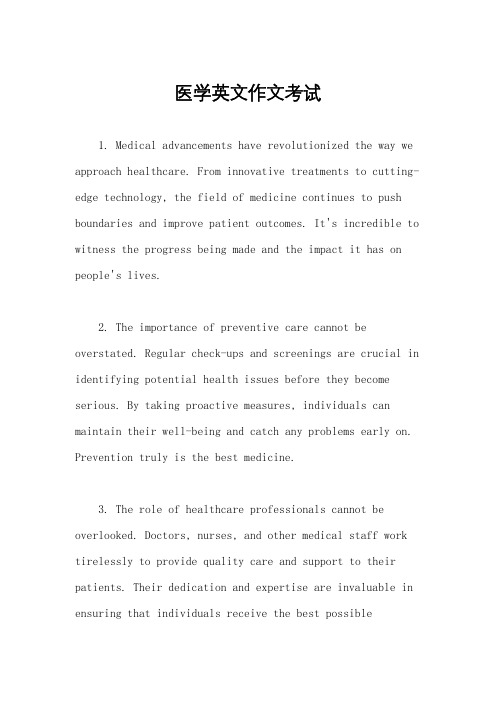
医学英文作文考试1. Medical advancements have revolutionized the way we approach healthcare. From innovative treatments to cutting-edge technology, the field of medicine continues to push boundaries and improve patient outcomes. It's incredible to witness the progress being made and the impact it has on people's lives.2. The importance of preventive care cannot be overstated. Regular check-ups and screenings are crucial in identifying potential health issues before they become serious. By taking proactive measures, individuals can maintain their well-being and catch any problems early on. Prevention truly is the best medicine.3. The role of healthcare professionals cannot be overlooked. Doctors, nurses, and other medical staff work tirelessly to provide quality care and support to their patients. Their dedication and expertise are invaluable in ensuring that individuals receive the best possibletreatment. We owe a great deal of gratitude to these healthcare heroes.4. The power of empathy in healthcare is often underestimated. Patients not only need medical treatmentbut also emotional support. A compassionate and understanding healthcare provider can make a world of difference in a patient's experience. It's important for healthcare professionals to listen attentively, show empathy, and provide a comforting presence.5. Medical research plays a pivotal role in advancing healthcare. Through rigorous studies and trials,researchers are able to uncover new treatments, medications, and therapies. Their efforts contribute to a better understanding of diseases and pave the way for improved patient care. The importance of funding and supporting medical research cannot be emphasized enough.6. Health education is key in empowering individuals to take control of their own well-being. By providing accurate and accessible information, people can make informeddecisions about their health. From understanding the benefits of a balanced diet to the importance of regular exercise, education is a powerful tool in promoting a healthy lifestyle.7. The impact of mental health on overall well-being is undeniable. It's crucial to address mental health issues and provide support to those in need. By reducing the stigma surrounding mental health and increasing access to mental health services, we can improve the overall quality of life for individuals.8. The field of telemedicine has gained significant traction in recent years. With the advancement of technology, patients can now receive medical consultations and treatment remotely. This not only provides convenience but also expands access to healthcare, particularly for those in rural or underserved areas.9. The COVID-19 pandemic has highlighted the resilience and adaptability of the healthcare industry. From frontline healthcare workers to researchers developing vaccines, theresponse to the pandemic has been nothing short of extraordinary. It has reminded us of the importance of preparedness and the need for global collaboration in times of crisis.10. In conclusion, the field of medicine continues to evolve and improve, thanks to advancements in technology, the dedication of healthcare professionals, and the importance of preventive care. It's an exciting time to be a part of the healthcare industry, and the future holds great promise for further advancements in patient care and well-being.。
医疗相关英文作文
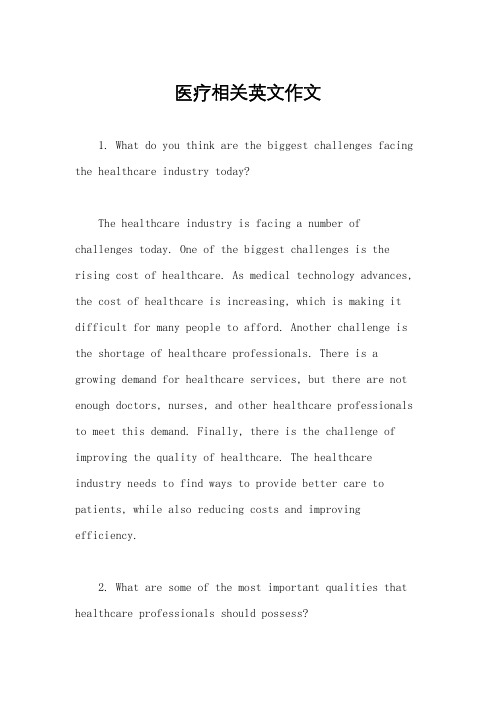
医疗相关英文作文1. What do you think are the biggest challenges facing the healthcare industry today?The healthcare industry is facing a number of challenges today. One of the biggest challenges is the rising cost of healthcare. As medical technology advances, the cost of healthcare is increasing, which is making it difficult for many people to afford. Another challenge is the shortage of healthcare professionals. There is a growing demand for healthcare services, but there are not enough doctors, nurses, and other healthcare professionals to meet this demand. Finally, there is the challenge of improving the quality of healthcare. The healthcare industry needs to find ways to provide better care to patients, while also reducing costs and improving efficiency.2. What are some of the most important qualities that healthcare professionals should possess?Healthcare professionals need to possess a number of important qualities. First and foremost, they need to be compassionate and caring. They should be able to connect with patients on a personal level and provide emotional support when needed. They also need to be knowledgeable and skilled in their field. Healthcare professionals should be up-to-date with the latest research and medical advancements, and should be able to apply this knowledge in their work. Finally, healthcare professionals should be good communicators. They need to be able to explain medical concepts to patients in a way that is easy to understand, and they should be able to communicate effectively with other healthcare professionals.3. How can we improve access to healthcare for people in underserved communities?Improving access to healthcare in underserved communities is a complex issue that requires a multifaceted approach. One way to improve access is to increase funding for community health centers and clinics. These facilitiesprovide affordable healthcare services to people who might not otherwise be able to afford them. Another way to improve access is to increase the number of healthcare professionals working in underserved communities. This can be done by providing incentives for healthcare professionals to work in these areas, such as loan forgiveness or other financial incentives. Finally, we need to address the underlying social determinants of healththat contribute to poor health outcomes in underserved communities, such as poverty, lack of education, and inadequate housing.4. What role do you think technology will play in the future of healthcare?Technology will play an increasingly important role in the future of healthcare. One way that technology is already being used is through telemedicine. This allows patients to connect with healthcare professionals remotely, which can be especially helpful for people who live inrural or remote areas. Technology will also be used to improve patient outcomes by providing more personalizedcare. For example, wearable devices can track a patient's health data, which can be used to create a personalized treatment plan. Finally, technology will be used to improve the efficiency of healthcare delivery. Electronic health records, for example, can help healthcare professionals to quickly access a patient's medical history, which can improve the quality of care and reduce the risk of medical errors.。
关于过度医疗问题的英语作文

关于过度医疗问题的英语作文## Overmedicalization.Overmedicalization is a term used to describe the excessive use of medical interventions, such as drugs, surgery, and diagnostic tests, when they are not medically necessary. This can lead to a number of problems, including:Increased costs: Overmedicalization can lead to increased healthcare costs, both for individuals and for society as a whole.Unnecessary side effects: Medical interventions can have side effects, and these can be harmful if the intervention is not necessary.Delayed diagnosis and treatment: Overmedicalizationcan delay the diagnosis and treatment of serious medical conditions, as patients may be distracted by unnecessary tests and treatments.Erosion of trust: When patients are overmedicalized, they may lose trust in their doctors and in the healthcare system as a whole.There are a number of factors that can contribute to overmedicalization, including:Fear of malpractice: Doctors may be afraid of being sued if they do not order enough tests or prescribe enough medication.Financial incentives: Some healthcare providers may be financially motivated to provide unnecessary services.Patient demand: Patients may demand medical interventions, even when they are not necessary.Lack of information: Patients may not be aware of the risks and benefits of medical interventions, and they may rely on their doctors to make decisions for them.Overmedicalization is a serious problem that can have a negative impact on individuals, families, and society as a whole. It is important to be aware of the signs and symptoms of overmedicalization, and to talk to your doctorif you are concerned that you may be receiving unnecessary medical care.## 过度医疗。
英语作文:医疗问题 Medical problem
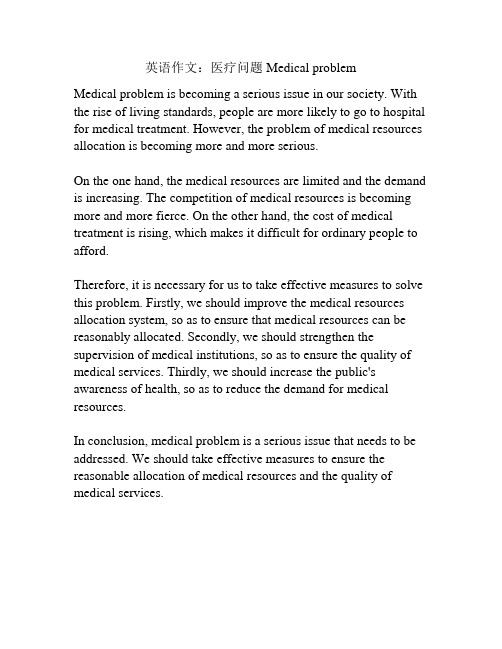
英语作文:医疗问题 Medical problemMedical problem is becoming a serious issue in our society. With the rise of living standards, people are more likely to go to hospital for medical treatment. However, the problem of medical resources allocation is becoming more and more serious.On the one hand, the medical resources are limited and the demand is increasing. The competition of medical resources is becoming more and more fierce. On the other hand, the cost of medical treatment is rising, which makes it difficult for ordinary people to afford.Therefore, it is necessary for us to take effective measures to solve this problem. Firstly, we should improve the medical resources allocation system, so as to ensure that medical resources can be reasonably allocated. Secondly, we should strengthen the supervision of medical institutions, so as to ensure the quality of medical services. Thirdly, we should increase the public's awareness of health, so as to reduce the demand for medical resources.In conclusion, medical problem is a serious issue that needs to be addressed. We should take effective measures to ensure the reasonable allocation of medical resources and the quality of medical services.。
关于医疗的英文作文
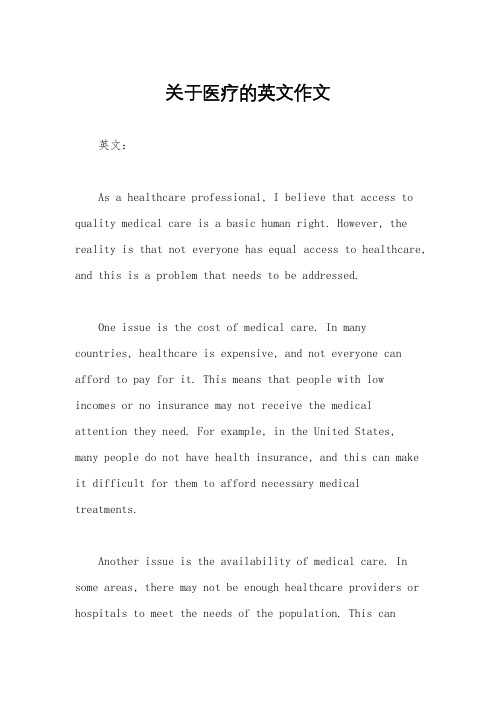
关于医疗的英文作文英文:As a healthcare professional, I believe that access to quality medical care is a basic human right. However, the reality is that not everyone has equal access to healthcare, and this is a problem that needs to be addressed.One issue is the cost of medical care. In many countries, healthcare is expensive, and not everyone can afford to pay for it. This means that people with low incomes or no insurance may not receive the medicalattention they need. For example, in the United States, many people do not have health insurance, and this can make it difficult for them to afford necessary medical treatments.Another issue is the availability of medical care. In some areas, there may not be enough healthcare providers or hospitals to meet the needs of the population. This canlead to long wait times for appointments or procedures, which can be detrimental to a patient's health. For instance, in rural areas of developing countries, there may be a shortage of doctors and medical facilities, making it difficult for people to receive timely medical care.To address these issues, governments and healthcare organizations need to work together to improve access to medical care. This can involve implementing policies to make healthcare more affordable, increasing funding for medical research and facilities, and training more healthcare professionals to meet the growing demand for medical care.中文:作为一名医疗专业人士,我相信获得优质医疗服务是一项基本人权。
- 1、下载文档前请自行甄别文档内容的完整性,平台不提供额外的编辑、内容补充、找答案等附加服务。
- 2、"仅部分预览"的文档,不可在线预览部分如存在完整性等问题,可反馈申请退款(可完整预览的文档不适用该条件!)。
- 3、如文档侵犯您的权益,请联系客服反馈,我们会尽快为您处理(人工客服工作时间:9:00-18:30)。
医疗问题高考模拟英语作文 题目:请根据下图,结合实际,写一篇英语短文,分析目前医疗服务现状及 其原因,并提出改进意见。
As is vividly shown in the picture, a patient with a cold is consulting his doctor. To his astonishment, the doctor recommends that he should do a set of physical check-ups. Having realized they are unnecessary, the patient immediately turns down the doctor's offer. 如图所示,一位感冒的病人正在咨询他的医生。
使他惊讶的是,他应该做一 套身体检查。
有意识到他们是不必要的,病人立即拒绝医生的报价。
The disturbing phenomenon has caused wide social concern. There are several underlying causes behind it. Nowadays, people tend to care more about their health and expect a longer life span, thus causing a boom in medical treatment. People are willing to spend more money on health care. Some hospitals take advantage of this and offer patients more unnecessary physical examinations in order to make more profits. 令人不安的现象引起了广泛的社会关注。
有几个背后的原因。
如今,人们更 关心他们的健康,期望寿命更长,从而导致了医疗的繁荣。
人们愿意花更多的钱 在医疗保健上。
一些医院利用这一优势,为患者提供更多不必要的体检,以使更 多的利润。
In my view, it's high time that urgent measures should be taken to improve the present situation. First, doctors should live up to patients' expectations and put saving people's lives above anything else. Second, the authorities should shoulder its responsibility to ensure that hospitals provide people with high-quality medical care at a reasonable price. (158 words) 在我看来,现在应该采取紧急措施来改善目前的形势了。
首先,医生应该对 病人的期望值,并把人的生命放在其他任何东西上面。
其次,当局应承担起它的 责任,确保医院为人民提供高质量的医疗服务,以合理的价格。
1/5
2/5
3/5
4/5
5/5
。
